Having the right battery is key to making your RV solar system efficient, reliable, and ready for any off-grid adventure. Your battery bank stores solar energy and powers everything in your rig when the sun isn’t shining, from lights and fans to fridges and laptops.
In this article, we’ll explore the best battery for RV solar and why deep cycle lithium (LiFePO4) batteries are the top choice for RVers with solar setup today.
Takeaways
When it comes to performance, reliability, and long-term value, deep cycle LiFePO4 batteries are the best batteries for RV solar systems. These batteries offer longer cycle life, higher usable capacity, faster charging, and lower maintenance than lead-acid, all critical features for off-grid RV living and solar applications.

Table of Content
Common Types of RV Solar Batteries: Pros & Cons
The three most common types used in RV applications are Flooded Lead-Acid, AGM, and Lithium (LiFePO4). Each has distinct advantages and disadvantages depending on your budget, space, usage habits, and long-term goals.
1. Flooded Lead-Acid (FLA) Batteries
FLA batteries are the most traditional type in RVs and off-grid systems. They are typically the most affordable option upfront, making them attractive to those on a tight budget or setting up a system for occasional use. However, they are typically heavy and bulky, making them difficult to move and install, especially in tight RV compartments. Also, they require regular maintenance and have a shorter lifespan.
2. AGM Batteries
AGM batteries are a sealed type of lead-acid battery that are spill-proof and more durable than traditional flooded lead-acid batteries. They are a good choice for bumpy RV travel or mobile environments. While comparing to lithium batteries, they offer lower usable capacity, fewer charge cycles, and slower charging speeds, making them less efficient in solar applications.
3. Lithium (LiFePO4) Batteries
LiFePO4 lithium battery is the modern standard for RV solar battery systems. These batteries offer nearly 100% usable capacity, ultra-long lifespan (3000–5000+ cycles), fast charging, and maintenance-free operation. They’re about 50% lighter than lead-acid, which saves valuable space and payload. Although the upfront cost is higher, they’re the most cost-effective choice in the long run—ideal for anyone relying on solar power while traveling off-grid.
Tips for Choosing an RV Solar Battery
1. Calculate Your Daily Energy Use
Start by listing all your appliances and their power consumption. Know how many watt-hours (Wh) you need per day so you can size your battery bank accordingly.
2. Choose Lithium for Efficiency and Longevity
While the upfront cost is higher, LiFePO4 lithium batteries provide 100% usable capacity, are lightweight, maintenance-free, and last 3 times longer than lead-acid.
3. Match Voltage with Your System
Make sure your battery matches your RV system voltage. For most RVs in the U.S., the voltage system is typically 12V, but 24V or 48V may be suitable for larger solar setups.
4. Confirm Solar Compatibility
Ensure your RV solar battery works well with your charge controller and inverter. A built-in BMS (Battery Management System) helps protect and regulate the battery.
5. Think About Portability and Space
If space is limited, go for compact or mini-sized lithium batteries. They save room and are easier to install or carry.
6. Consider Monitoring Features
Batteries with Bluetooth or app-based monitoring let you check status (voltage, SOC, cycles) anytime. They are ideal for off-grid and remote use.
7. Plan for Future Expansion
Buy batteries that are easy to scale up—adding more capacity in the future without needing to replace the whole system.
8. Long Lifespan
The best solar batteries should last for thousands of cycles. A lithium battery with 3000–5000+ cycles will support years of off-grid living.
6 Top Deep Cycle Lithium Batteries for RV Solar System
Redodo offers a range of high-performance deep cycle LiFePO4 batteries designed specifically for RV and solar use, with the long lifespan of 4,000-15,000 cycles. Here are the top choices for RV solar system:
Redodo 12V 300Ah Deep Cycle Lithium Battery
- Power: 2560W
- Energy: 3840Wh
- Weight: 59.6Ibs
- Size: L20.55*W9.33*H8.58 inch
- Price: ~$549
For extended off-grid stays or high-consumption setups, the 12V 300Ah lithium battery offers massive capacity in a single unit. It’s a favorite for solar RVers who want to run air conditioners, induction cooktops, or multiple appliances with confidence. At the 1C of discharge rating, the 300Ah battery has the same usable capacity as six 12V 100Ah AGM batteries, while saving 65% space and 83% weight.
Redodo 12V 280Ah Lithium Battery with Low-temp Protection
- Power: 2560W
- Energy: 3584Wh
- Weight: 59.2Ibs
- Size: L20.55*W9.45*H8.58 inch
- Price: ~$499
This 12V 280Ah lithium battery is equipped with built-in low-temperature charging protection, making it ideal for RVers who travel in colder climates. With 3584Wh of capacity and advanced safety features, it offers peace of mind and reliable power in every season. Combine it with your solar panels for efficient year-round energy storage.
Redodo 12V 200Ah Plus Deep Cycle Lithium Battery
- Power: 2560W
- Energy: 2560Wh
- Weight: 45.59 lbs
- Size: L21*W8.2*H 8.5 inch
- Price: ~$419
The 200Ah Plus deep cycle battery balances high capacity with a compact footprint. It’s a great middle-ground option for RV solar systems, offering 2560Wh of energy and 2560W of output power—enough to power your fridge, lights, fans, and electronics through the night. With excellent scalability, it's a smart upgrade for most medium to large RV solar setups.
Redodo 12V 165Ah Group 31 Bluetooth Lithium Battery
- Power: 2112W
- Energy: 2112Wh
- Weight: 33 lbs
- Size: L13*W6.77*H8.5 inch (Group 31)
- Price: ~$349
The 12V 165Ah battery has broken the capacity limit under the Group 31 size, offering 65% more capacity than the standard 12V 100Ah Group 31 battery. It’s ideal for RVers who want to save space while need more capacity. With smart Bluetooth function, you can keep a close eye on your solar system performance without extra monitoring equipment.
Reodod 12V 100Ah Group 24 Bluetooth Lithium Battery
- Power: 1280W
- Energy: 1280Wh
- Weight: 21.8 lbs
- Size: L10.24*W6.61*H8.30 inch (Group 24)
- Price: ~$249
Compact yet powerful, this Group 24 Bluetooth lithium battery is perfect for RVs and travel trailers. With Bluetooth 5.0 built-in, you can monitor state of charge, voltage, temperature, and more from your phone. It’s lightweight, easy to carry, and perfect for solar users upgrading from lead-acid in tight compartments.
Redodo 24V 100Ah Deep Cycle Lithium Battery
- Power: 2560W
- Energy: 2560Wh
- Weight: 45.58 lbs
- Size: L20.95*W8.15*H8.5 inch
- Price: ~$419
For larger 24V RV system, this 24V lithium battery is an ideal solar energy solution. With 2560Wh of energy and a 2.56kW power output, it's ideal for medium to large RV solar systems that run 24V inverters or appliances, reducing current flow and wiring losses, and more efficient for higher power demands. It’s lightweight, maintenance-free, and built to last 4000+ cycles.
How Many Batteries Do I Need for My RV Solar System?
Sizing your battery bank is one of the most important steps in setting up a solar-powered RV. The number of batteries you need depends entirely on your daily power consumption. Start by calculating how many watt-hours (Wh) you use in a typical day.
For example, a small fridge might use 500Wh, lighting could use 100Wh, and your devices might draw another 400Wh—totaling about 1000Wh per day.
Now consider that a 12V 100Ah lithium battery stores around 1280Wh of usable energy. That means one battery might meet your needs, but having two gives you a buffer for cloudy days or increased energy use.
If you plan to run high-demand appliances like an air conditioner or microwave, or if you want 2–3 days of autonomy, you’ll need a larger capacity system or additional batteries wired in parallel.
Related Reading: How Many Solar Batteries Do I Need to Power a House?
How Much Does an RV Solar System Cost?
A basic setup with a couple of panels, a charge controller, and a single lithium battery might cost around $800 to $1,500. A larger system with more panels, higher battery capacity, a powerful inverter, and advanced monitoring features could easily run $2,500 to $4,000 or more.
| Component | Estimated Cost |
|---|---|
| Solar Panels (300–600W) | $300–$800 |
| Charge Controller (MPPT) | $100–$300 |
| Inverter (1000–3000W) | $100–$300 |
| Solar Battery Bank | $200–$1000+ |
| Wiring, Mounts, Fuses | $100–$300 |
While lead-acid batteries are cheaper upfront, they degrade quickly and require regular maintenance. Lithium batteries cost more initially but deliver longer life, higher efficiency, and zero maintenance—making them a smarter investment for serious RVers.
Explore Redodo's solar accessories at a budget-friendly price, including MPPT charge controller, inverters, and more.
FAQs about Best RV Solar Battery
Do lithium RV batteries need a special solar charge controller?
Yes, for optimal performance and safety, your system should include a lithium-compatible MPPT charge controller. MPPT controllers are more efficient and allow for custom voltage settings that match the charging profile of LiFePO4 batteries, ensuring proper charging and extending battery life.
Are lithium batteries safe for RV use?
Absolutely. Modern LiFePO4 lithium batteries include a built-in Battery Management System (BMS) that protects against overcharging, over-discharging, overheating, overcurrent, and short circuits. They are thermally stable, non-toxic, and safer than other lithium chemistries, making them ideal for enclosed and mobile environments like RVs.
Can I mix different types or brands of batteries in my RV solar system?
It's not recommended to mix battery types (e.g., lithium with AGM or flooded lead-acid) or different brands of batteries, as it can lead to imbalance, reduced performance, and even safety issues. For best results, use identical lithium batteries from the same brand and batch, especially when wiring them in parallel or series.
Conclusion
Investing in the right battery is the foundation of a reliable and efficient RV solar setup. Among all available options, deep cycle lithium batteries, especially LiFePO4, stand out as the best battery for RV solar systems. They offer superior performance, longer lifespan, higher energy efficiency, and zero maintenance, making them ideal for both weekend getaways and full-time off-grid living.
Redodo provides a wide range of lithium RV batteries to match your off-grid lifestyle. With solar compatibility, reliable performance, and long cycle life of up to 10 years, these batteries will keep your rig powered wherever the road takes you.
Read More:

Redodo

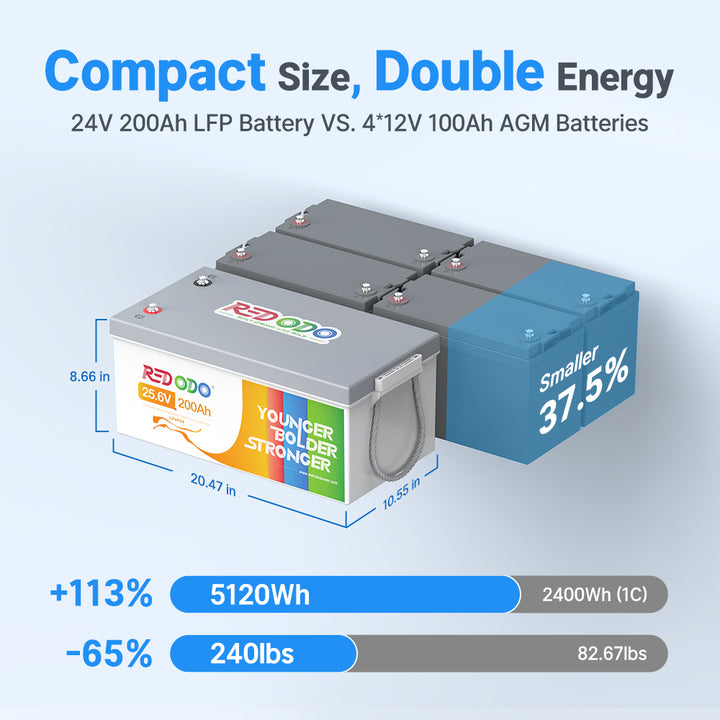
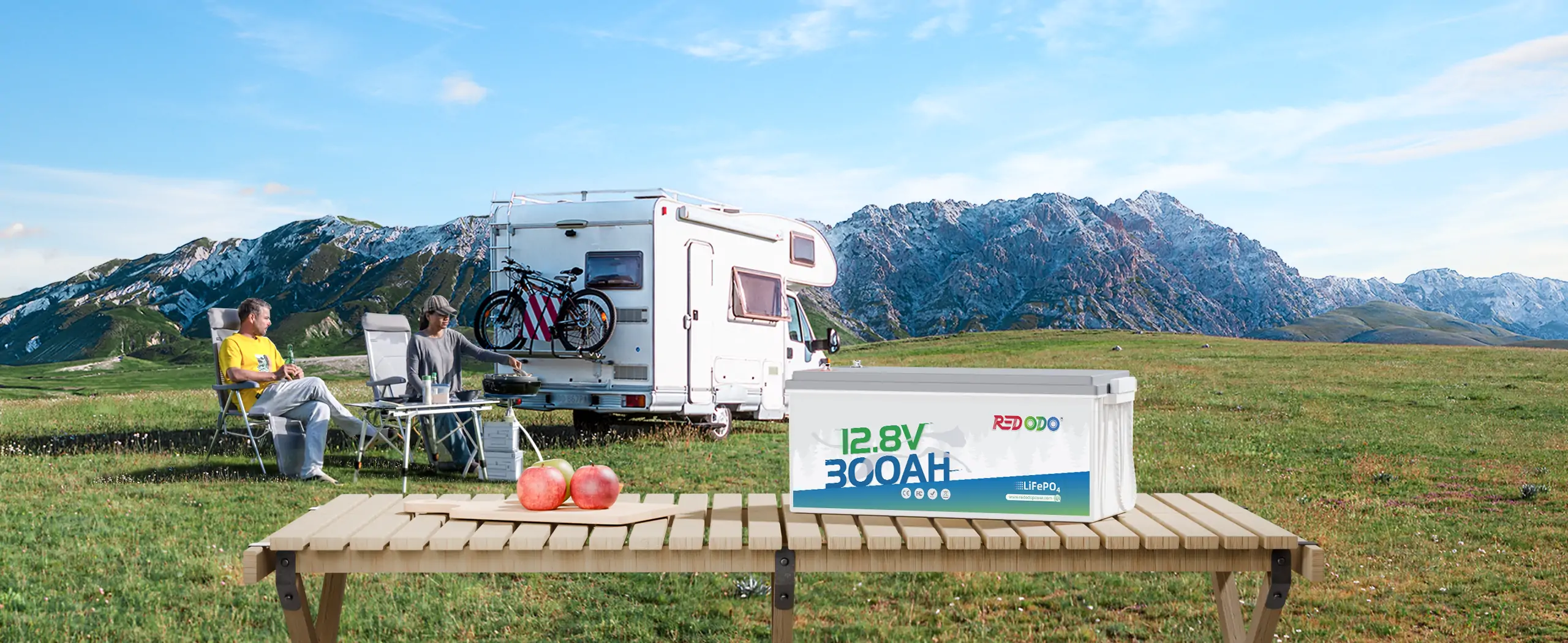
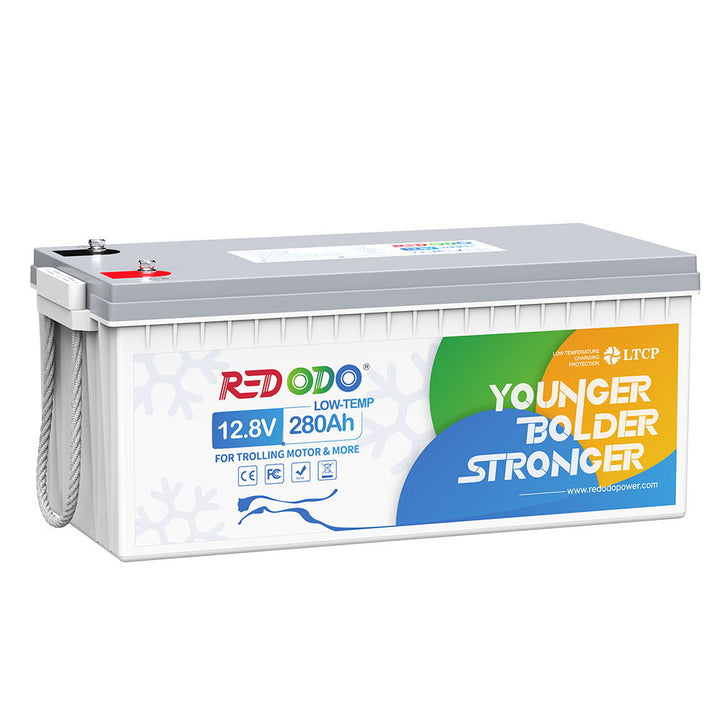
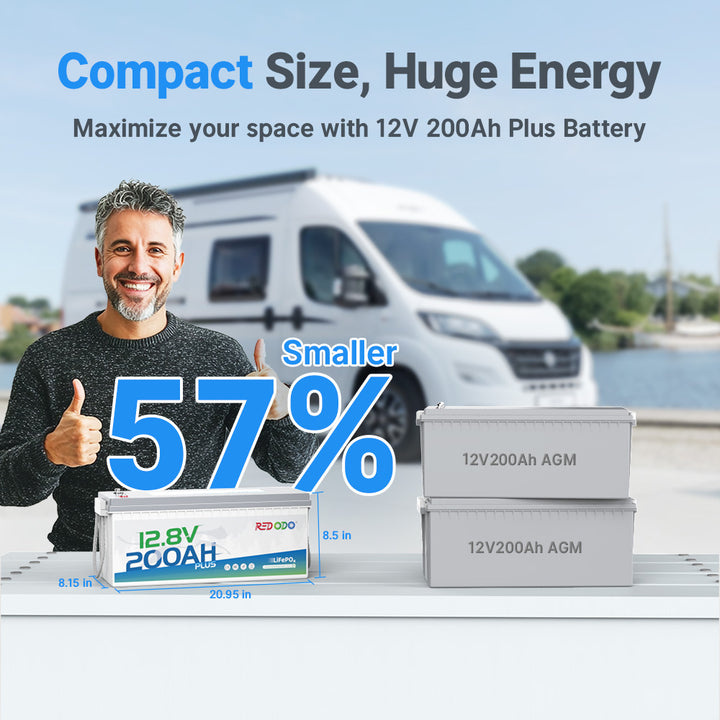
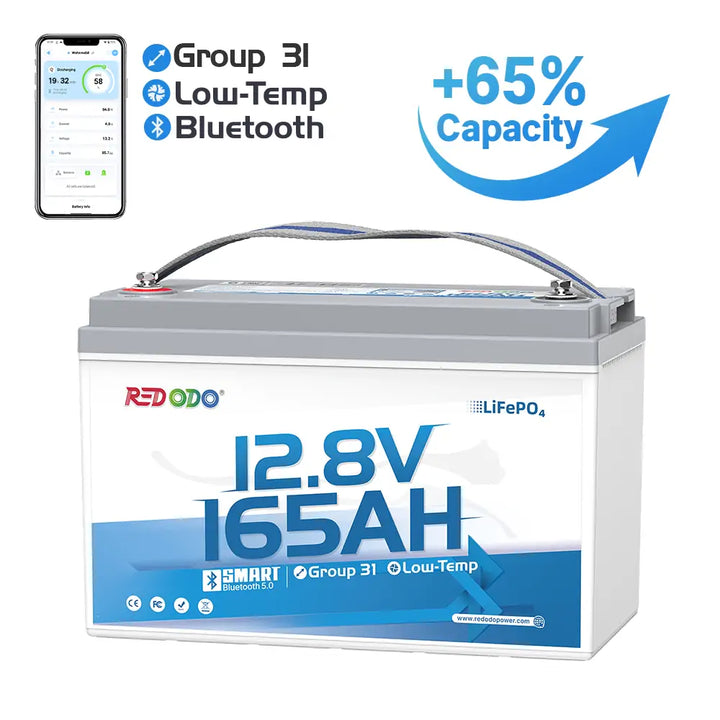
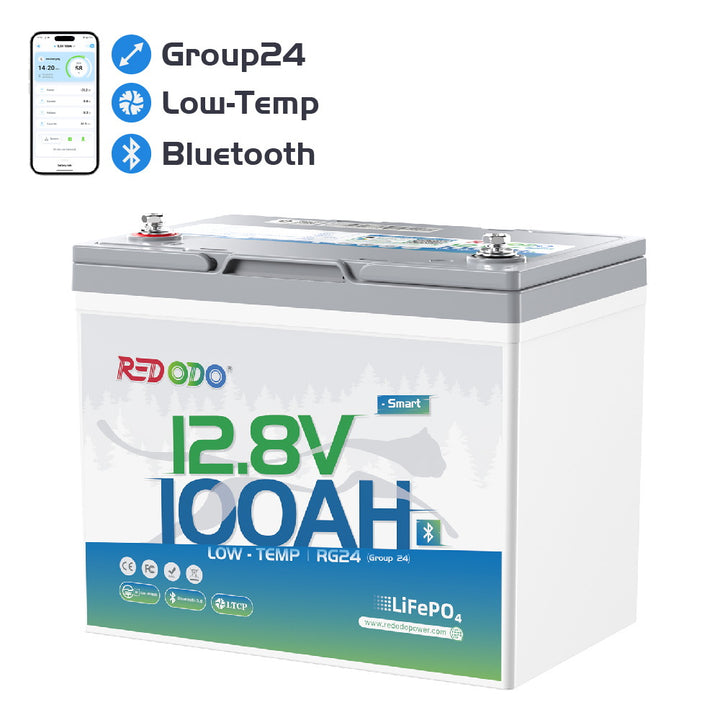
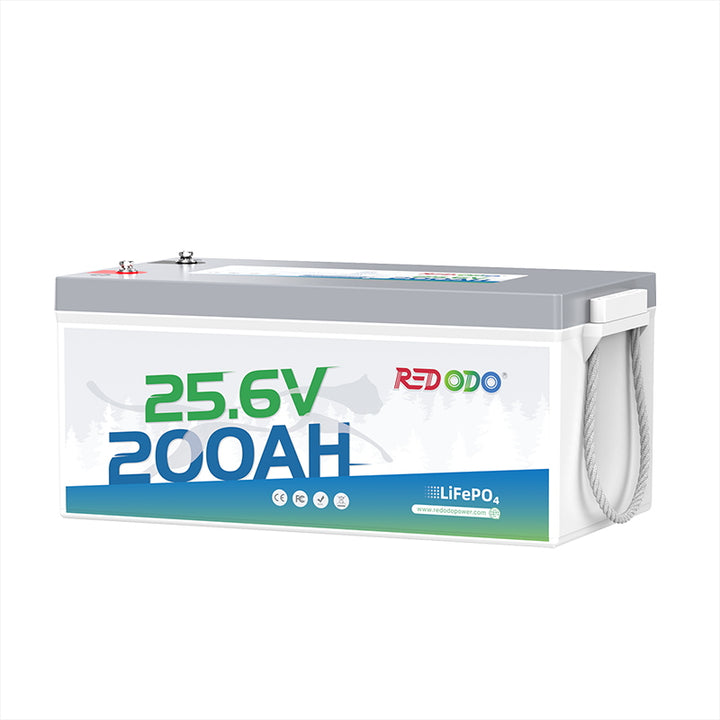








![⚡[$225 after Subscription] Redodo 12V 100Ah Group 24 Bluetooth LiFePO4 Battery | Real-Time Battery Monitoring | For RV, Marine, Solar](http://www.redodopower.com/cdn/shop/files/Redodo_12V_100Ah_group_24_bluetooth_lithium_battery.jpg?v=1754036994)







![⚡[$266 after Subscription] Redodo 12V 140Ah Group 31 Lithium Battery with Bluetooth | 40% More Capacity | For RV, Marine, Solar Home](http://www.redodopower.com/cdn/shop/files/Redodo_12V_140ah_bluetooth_battery_ee6d5fd1-5c7d-4b9a-90ab-d54d06b29a04.jpg?v=1754037353)